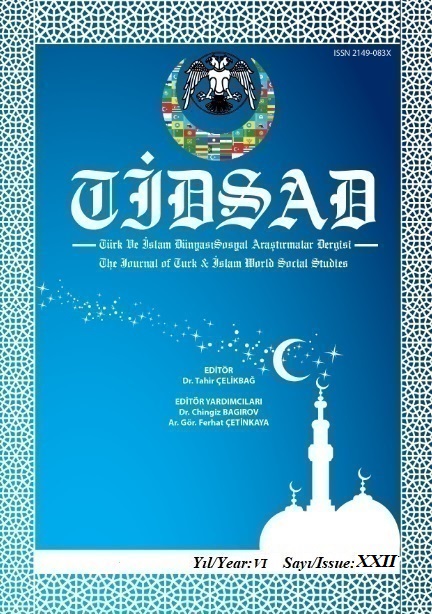Author :
Abstract
Öz Köy enstitüleri eğitim tarihimizin önemli örnekleri arasında yer almaktadır. Enstitülerde kuruluş felsefesine uygun olarak bireyin temel ve uygulamalı bir eğitim sürecine dahil edilmesi amaçlanmıştır. Müfredatta genel kültür dersleri ile birlikte tarım ve teknik konulu derslerde yer almaktadır. Okuryazar nüfusun 1935- 1950 yılları arasında oldukça düşük olması sebebiyle Türkçe öğretimi ve okuma alışkanlığı önemli bir yere sahiptir. Her öğretmen, öğrenci için bir rol model olarak görülmüş ve öğretmenlerin bireyde okuma ve kütüphane kullanım alışkanlığı oluşturması hedeflenmiştir. Bu amaçla enstitülerin temel bileşenleri arasında kitap ve kütüphane önemli bir yer edinmiştir. Araştırmamızda Köy Enstitülerinin eğitim tarihimiz açısından önemine değinilirken, ayrıca temel bileşenleri arasında yer alan ve eğitimin bir parçası olarak görülen kütüphaneler değerlendirilmiştir.
Keywords
Abstract
Abstract Village institutes are important examples of our educational history. In accordance with the founding philosophy of the Village Institutes, it was aimed to include the individual in a basic and applied education process. In the curriculum, courses on agriculture and technical courses are given along with general culture courses. Since the illiterate population was quite low between 1935 and 1950, Turkish education and the habit of reading books had an important place. Each teacher was seen as a role model for the student and it was aimed that teachers would create a habit of reading and using library in the individual. For this purpose, books and libraries have an important place among the main components of the Village Institutes. In our study, the importance of the Village Institutes in terms of our educational history was mentioned. In addition, the libraries which were accepted as part of the education in Village Institutes were evaluated.
Keywords
- Akyüz, Y. (2008). Türk Eğitim Tarihi. Ankara: Pegem Akademi Yayıncılık.
- Almalı, S. (2018). Ortaokul 8. Sınıflar Basit Makineler Ünitesine Köy Enstitüleri Örneklerinin Yansımaları. Yayımlamamış yüksek lisasn tezi. Mersin Üniversitesi.
- Anadolu Eğitim Sendikası. (2018). Köy Enstitüleri Cumhuriyetin Sabah Güneşidir. Retrieved from http://www.aes.org.tr/haber-908-koy-enstituleri-cumhuriyetin-sabahgunesidir.html
- Arslan, B. (2006). Cumhuriyet dönemi eğitiminde köy eğitmenleri projesi. Yayınlanmamış yüksek lisans tezi. İstanbul Üniversitesi.
- Aysal, N. (2005). Anadolu’da aydınlanma hareketinin doğuşu: Köy enstitüleri. Ankara Üniversitesi Türk İnkılâp Tarihi Enstitüsü Atatürk Yolu Dergisi , Mayıs-Kasım, 35–36, 267–282.
- Bahadır, Z. (1994). Köy Enstitülerinin Sosyolojik İncelenmesi. Yayımlanmamış doktora tezi. Cumhuriyet Üniversitesi.
- Ersil, G. (2007). Cumhuriyet devrimizin özgün eğitim kurumları köy enstitülerinde müzik eğitimi ve günümüze yansımaları. Yüksek Lisans Tezi. Gazi Üniversitesi.
- Eser, G. (2011). Köy Enstitüleri'nde Bir Öncü: Özgün Arşivi Işığında Göl Köy Enstitüsü. Yayımlanmamış Doktora Tezi. İstanbul Üniversitesi Atatürk İlkeleri ve İnkilap Tarihi Enstitüsü Atatürk İlkeleri ve İnkilap Tarihi Anabilim Dalı.
- Eskicumalı, A. (2003). Eğitim ve toplumsal değişme: Türkiye'nin değişim sürecinde eğitimin rolü, 1923-1946. 1923-1946. Boğaziçi Üniversitesi Eğitim Dergisi, 19(2), 15-29.
- Karal, E. Z. (1956). Osmanlı Tarihi, Cilt 7. Ankara: Türk Tarih Kurumu Basımevi.
- Kepenek, M. (2001). Basında Köy Enstitüleri Cilt II 1944-1949. Ankara: K.E. ve Ç.E. Vakfı.
- Köy Enstitüleri ve Çağdaş Eğitim Vakfı (2004). Köy Enstitüleri Programları, yayına hazırlayan Niyazi Altunya. Ankara.
- Köy Enstitüleri ve Çağdaş Eğitim Vakfı (2005). Köy Enstitüleri ile İlgili Yönetmelik ve Resmi Yazılar, yayına hazırlayan Mustafa Aydoğan. Ankara.
- Makal, M. (1995). Köy Enstitülerinde Okuma”, Köy Enstitülerinde Kitap, Kitaplık ve Okuma, Yayına Hazırlayan Hasan S. Keseroğlu. İstanbul,: Türk Kütüphaneciler Derneği İstanbul Şubesi Yayınları No: 15.
- Sakaoğlu, N. (1991). Cumhuriyet dönemi eğitim tarihi. İstanbul: İletişim Yayınları.
- Saydur, M., & Yılmaz, H. T. (1994). Bir Tonguç Okulu Gölköy Enstitüsü. İstanbul: Görkem Yayınları.
- Tan, O. (2010). Köy Enstitülerinde Demokrasi Eğitimi ve Liderlik: Nitel Bir Araştırma. Yayımlanmamış yüksek lisans tezi. Akdeniz Üniversitesi.
- Tonguç, E. (2009). Bir Eğitim Devrimcisi İsmail Hakkı Tonguç, Yaşamı, Öğretisi, Eylemi. İstanbul: Yeni Kuşak Köy Enstitüleri Derneği Yayınları.
- Tonguç, İ. H. (1946). İlköğretim kavramı. İstanbul: Remzi Kitabevi.
- Tonguç, İ. H. (1998). Eğitim Yolu ile Canlandırılacak Köy. Ankara: KEÇEV Yayınları.
- Tonguç, İ. H. (2004). İlköğretim Kavramı. Ankara: Piramit Yayıncılık.
- Toprak, G. (2008). Cumhuriyetin ilk dönemlerinde Türk eğitim sistemi ve Köy Enstitüleri. Yüksek Lisans Tezi. Afyon Kocatepe Üniversitesi.
- Turan, Ş. (1999). Türk devrim tarihi, 4.kitap. Ankara: Bilgi Yayınevi.
- Türkoğlu, P. (2000). Tonguç ve Enstitüleri. İstanbul: Türkiye İş Bankası Kültür Yayınları.





